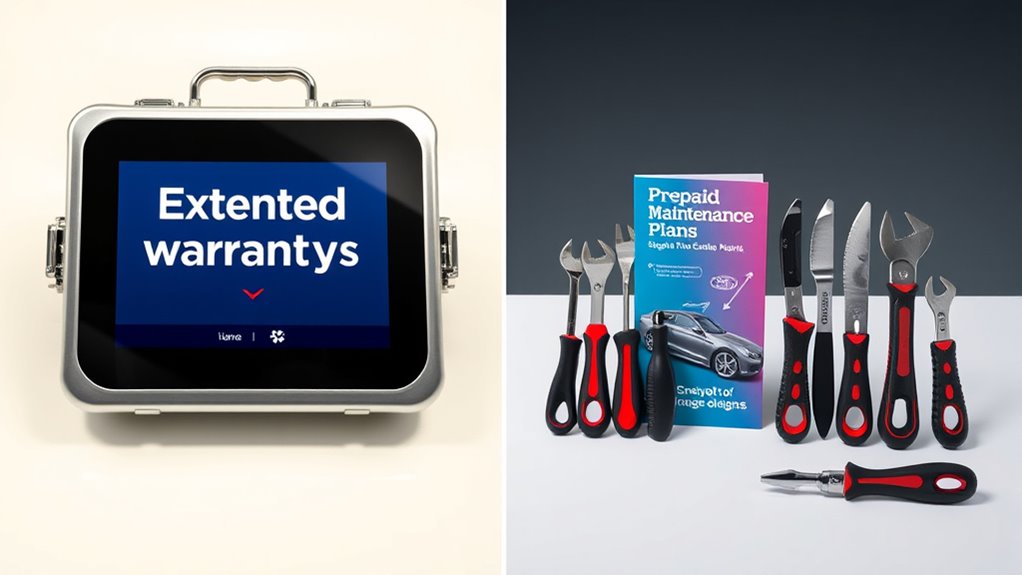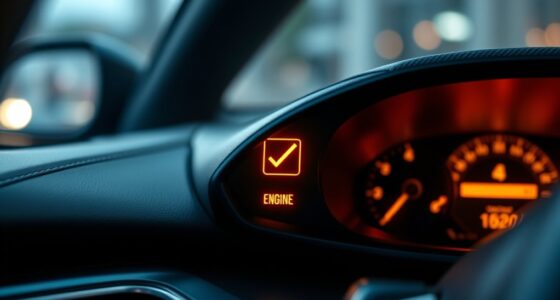Extended warranties and prepaid maintenance plans help manage vehicle costs but serve different purposes. An extended warranty covers repairs for major components after the manufacturer’s guarantee ends, while prepaid plans pay upfront for routine services like oil changes and tire rotations. Knowing their differences can help you choose what suits your driving needs best. Keep exploring to understand how each option can protect your budget and extend your vehicle’s lifespan.
Key Takeaways
- Extended warranties cover repairs after the manufacturer’s warranty expires, while prepaid plans cover scheduled maintenance services.
- Warranties may exclude certain components and include deductibles; prepaid plans do not cover repairs, only routine upkeep.
- Warranties help protect against unexpected repair costs; prepaid plans help budget routine maintenance expenses.
- Extended warranties often cover major parts like engines and transmissions; prepaid plans focus on regular service intervals.
- Choose based on vehicle usage, ownership duration, and whether you prefer protection against repairs or predictable maintenance costs.

When choosing between extended warranties and prepaid maintenance plans, understanding their differences can help you make a smarter decision for your vehicle. Both options aim to protect you financially, but they do so in distinct ways. Extended warranties primarily cover repairs and parts after your manufacturer’s basic warranty expires. They act as a safety net, ensuring you’re not hit with hefty repair bills unexpectedly. However, it’s essential to pay attention to coverage limitations, as not everything might be included. Some policies exclude certain components or wear items, which could leave you responsible for specific repairs. This makes it critical to thoroughly review what’s covered and what’s not before committing.
On the other hand, prepaid maintenance plans focus on routine services like oil changes, tire rotations, brake inspections, and fluid replacements. They help you budget for upcoming maintenance costs, often at a fixed price. These plans usually emphasize scheduled services outlined in your vehicle’s maintenance schedule, so you stay on top of upkeep without surprise expenses. When comparing costs, prepaid plans often offer a clear cost comparison, making it easier to predict your future expenses. They can be more cost-effective if you plan to keep your car for a long time, especially since they lock in prices and prevent inflation of service costs over the years. Additionally, wall organization systems can complement your vehicle maintenance by keeping your garage or storage area organized, making routine upkeep more efficient.
Another key difference lies in what they cover. Extended warranties are designed to cover unexpected repairs, which can include major components like the transmission, engine, or electrical systems. But, coverage limitations mean that some major repairs could still be excluded or have deductibles, so you may need to pay out-of-pocket for certain issues. Prepaid maintenance plans, conversely, don’t cover repairs but ensure you don’t forget or skip routine services, which can prolong your vehicle’s lifespan and improve resale value.
Frequently Asked Questions
Can I Purchase Both Extended Warranties and Prepaid Plans Simultaneously?
Yes, you can purchase both an extended warranty and a prepaid maintenance plan at the same time. However, you should watch for plan overlap and coverage limits. Some plans may duplicate services, which could lead to unnecessary costs. Always review the details carefully, so you understand what each plan covers and avoid paying for redundant benefits. This way, you maximize your coverage without exceeding your budget.
Do Prepaid Maintenance Plans Cover Repairs or Just Routine Services?
Think of a prepaid maintenance plan as a well-tended garden—focused on routine care. It generally covers regular services like oil changes and inspections, but not repairs from breakdowns or unexpected issues. The coverage scope is limited to scheduled maintenance, and plan limitations mean you won’t get repairs covered unless specified. Always check the fine print to understand what’s included and what’s not, so you’re not caught off guard.
Are There Any Cancellation Fees for Either Plan?
You should check the cancellation policies for each plan, as they vary. Some prepaid maintenance plans and extended warranties may charge cancellation fees if you decide to cancel early. Also, consider plan transferability—certain plans let you transfer benefits to another person or vehicle, adding flexibility. Always review the specific terms before signing up to understand any fees or transfer options, ensuring you choose the plan that best fits your needs.
How Do These Plans Impact the Resale Value of My Vehicle?
Imagine you’re selling your car—do you wonder how plans like extended warranties or prepaid maintenance affect its resale impact? These plans can either boost your vehicle value, showing it’s been well cared for, or raise questions about potential costs. The truth is, a good maintenance plan can make your vehicle more attractive to buyers, possibly increasing resale value, while poorly managed plans might do the opposite. Stay informed to maximize your car’s worth!
Can I Transfer My Plan if I Sell My Car?
When you sell your car, you might wonder about transferability options for your plan. Many prepaid maintenance plans are transferable, allowing the new owner to enjoy the benefits, which can boost your vehicle’s resale value. However, you should check for plan limitations, as some warranties or plans may have restrictions or require fees for transfer. Always review your plan’s terms to guarantee a smooth transfer process.
Conclusion
Understanding the difference between extended warranties and prepaid maintenance plans is like choosing between a safety net and a trusted guide. Both offer peace of mind, but they serve different needs. Think of them as your vehicle’s protective armor or a personal coach helping you keep it in top shape. By knowing what each covers, you’ll make smarter decisions, ensuring your car stays as reliable as a loyal friend, ready for every journey ahead.









